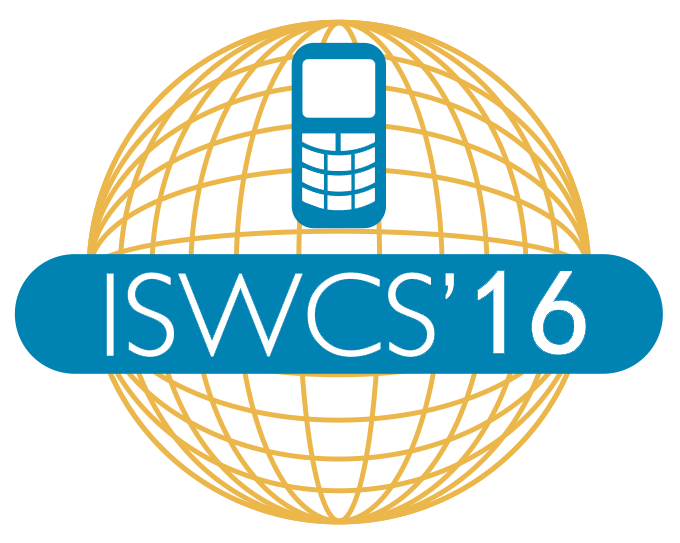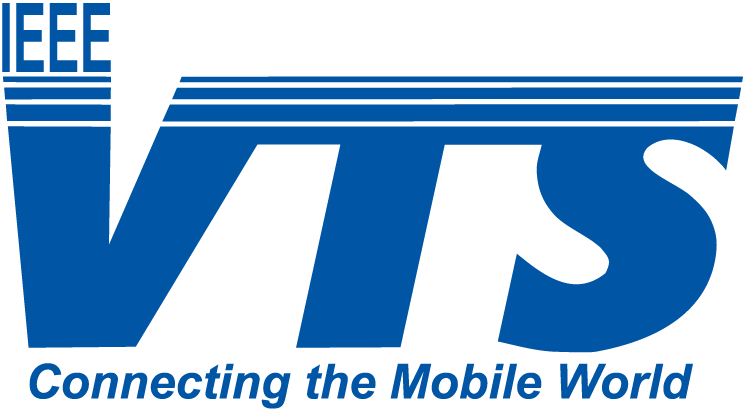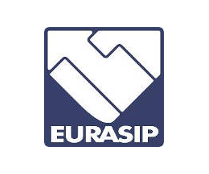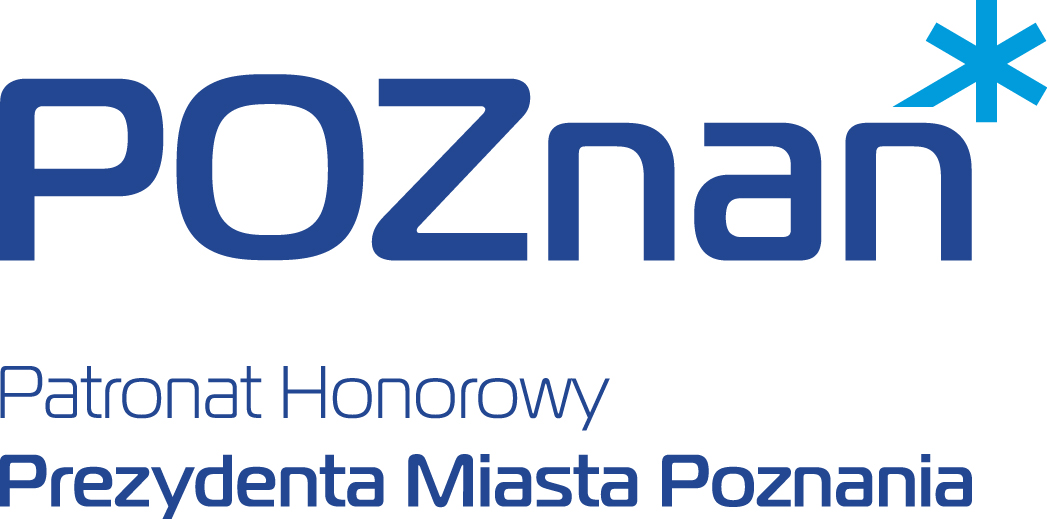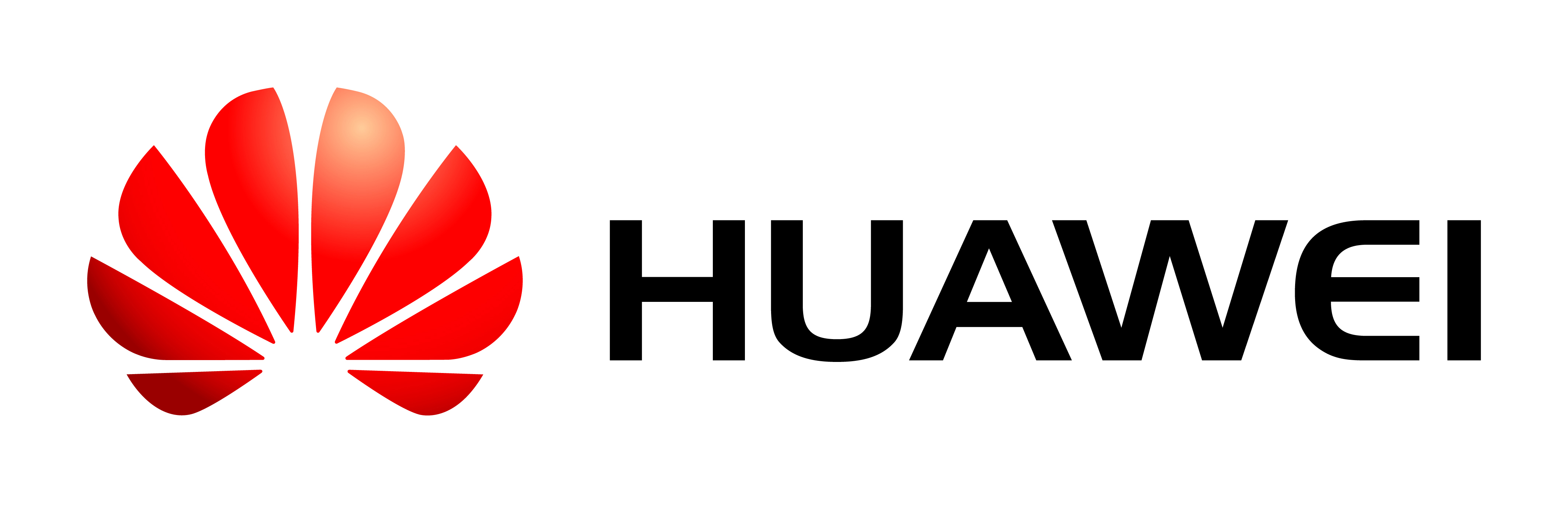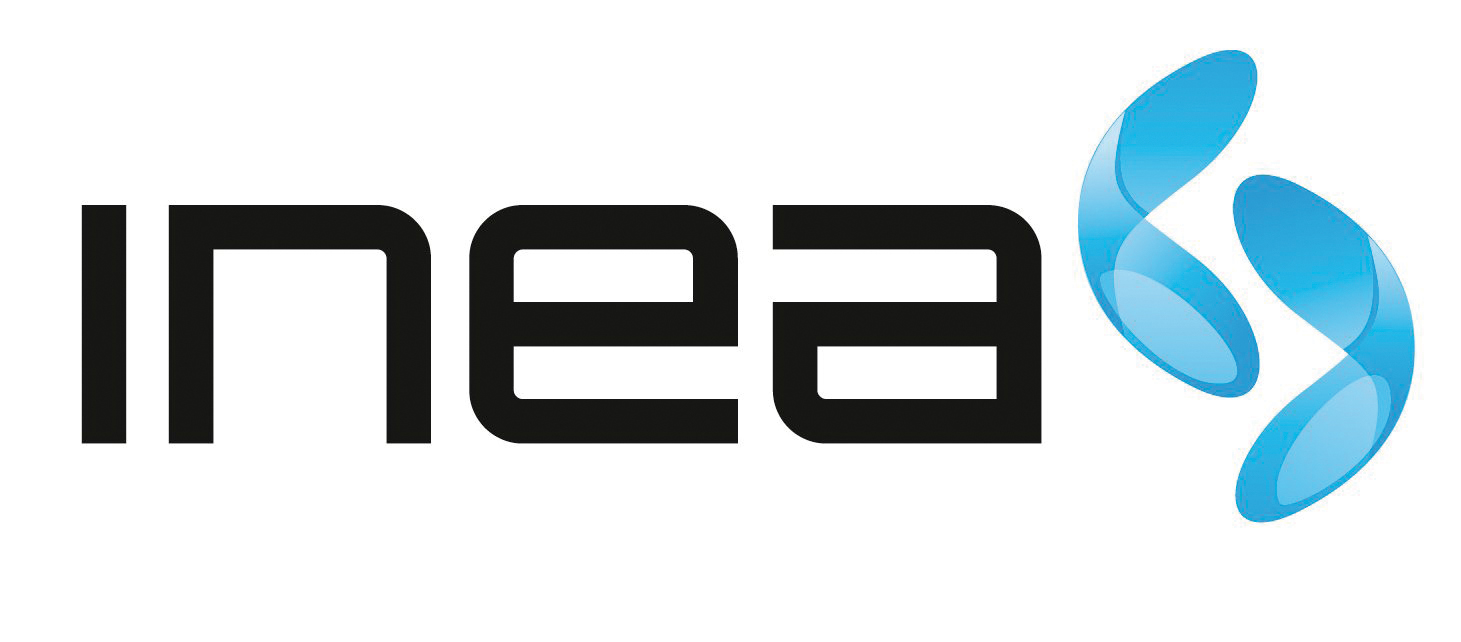Program
Full conference program available to download (in PDF) can be found here.
Full Conference Program

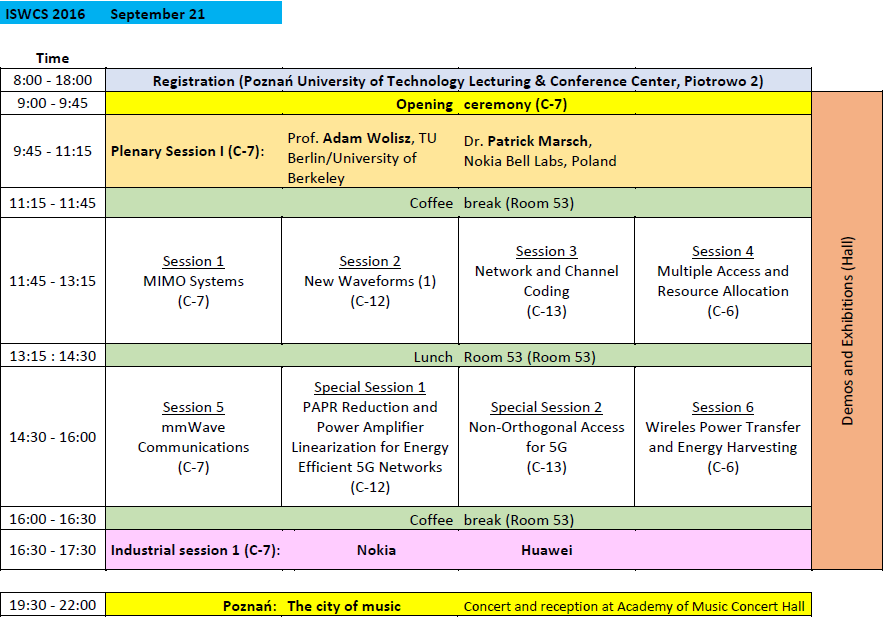
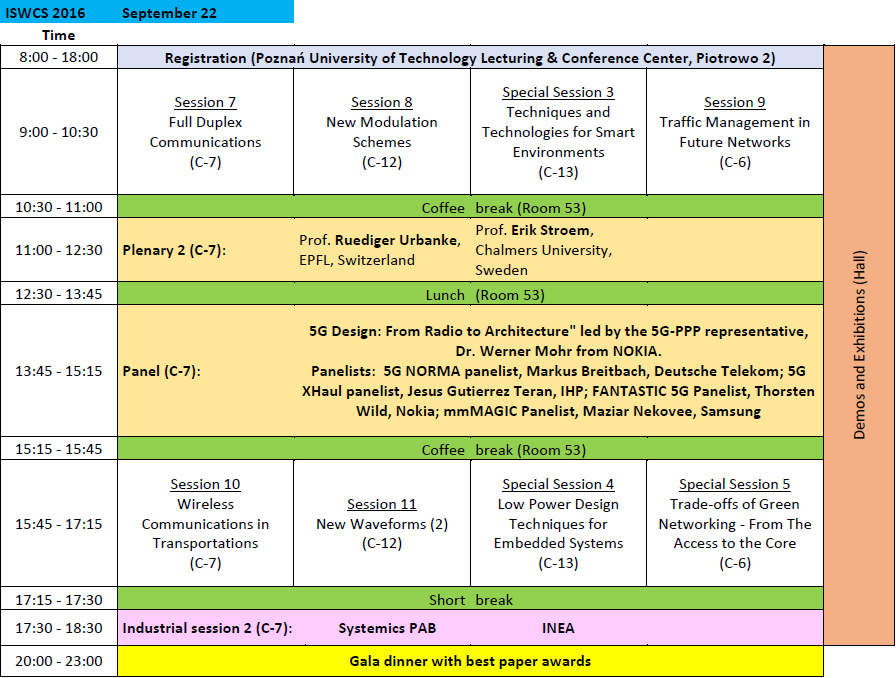
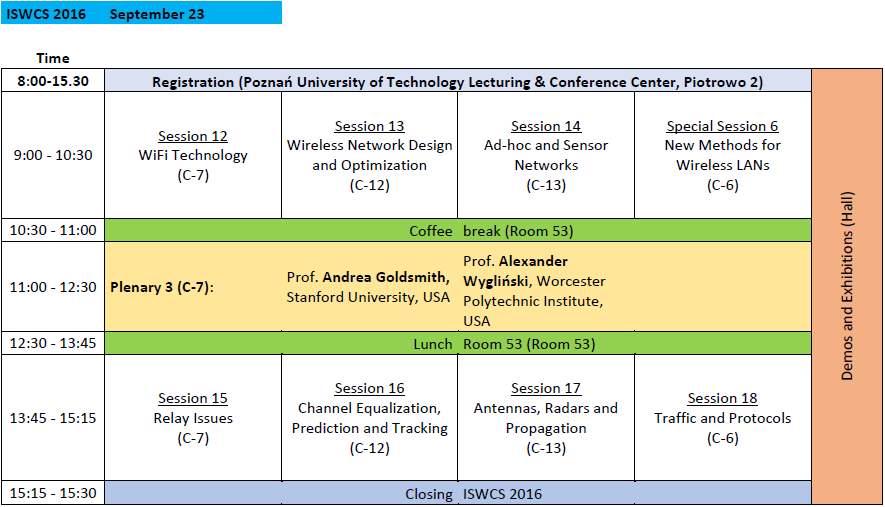
Conference rooms
Poznan University of Technology - kampus
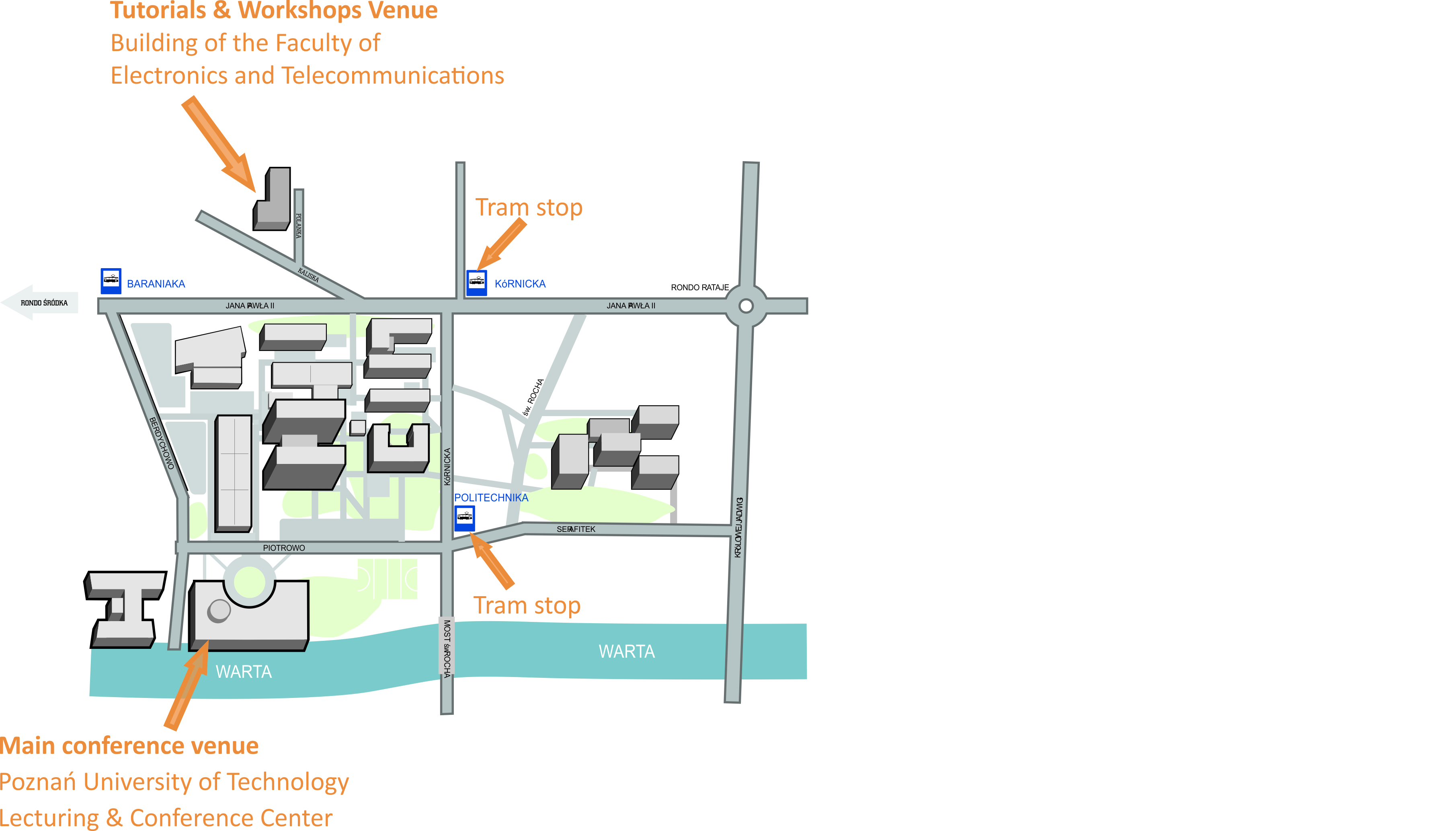
Building of the Faculty of Electronics and Telecommunications, Poznań University of Technology
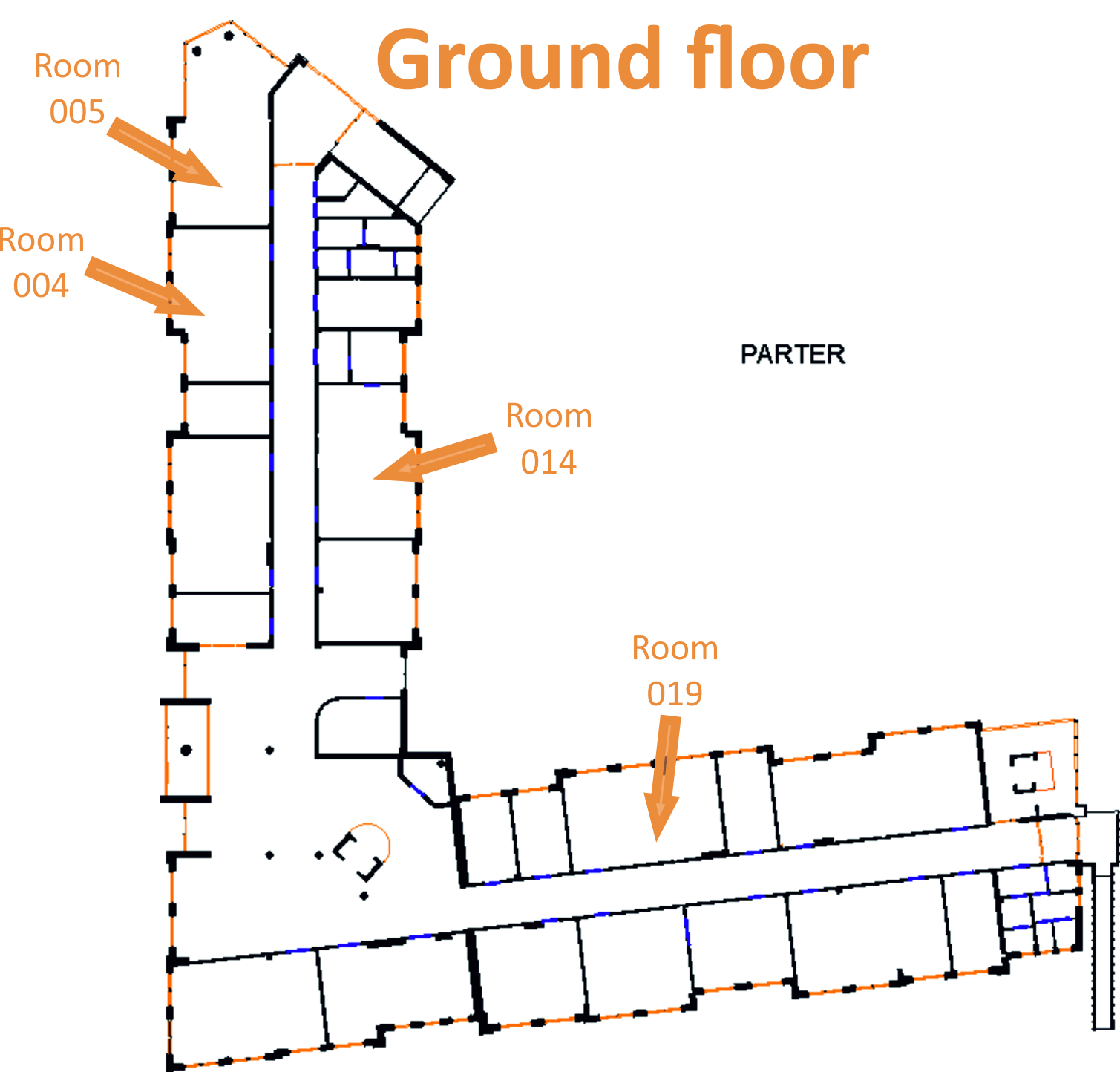
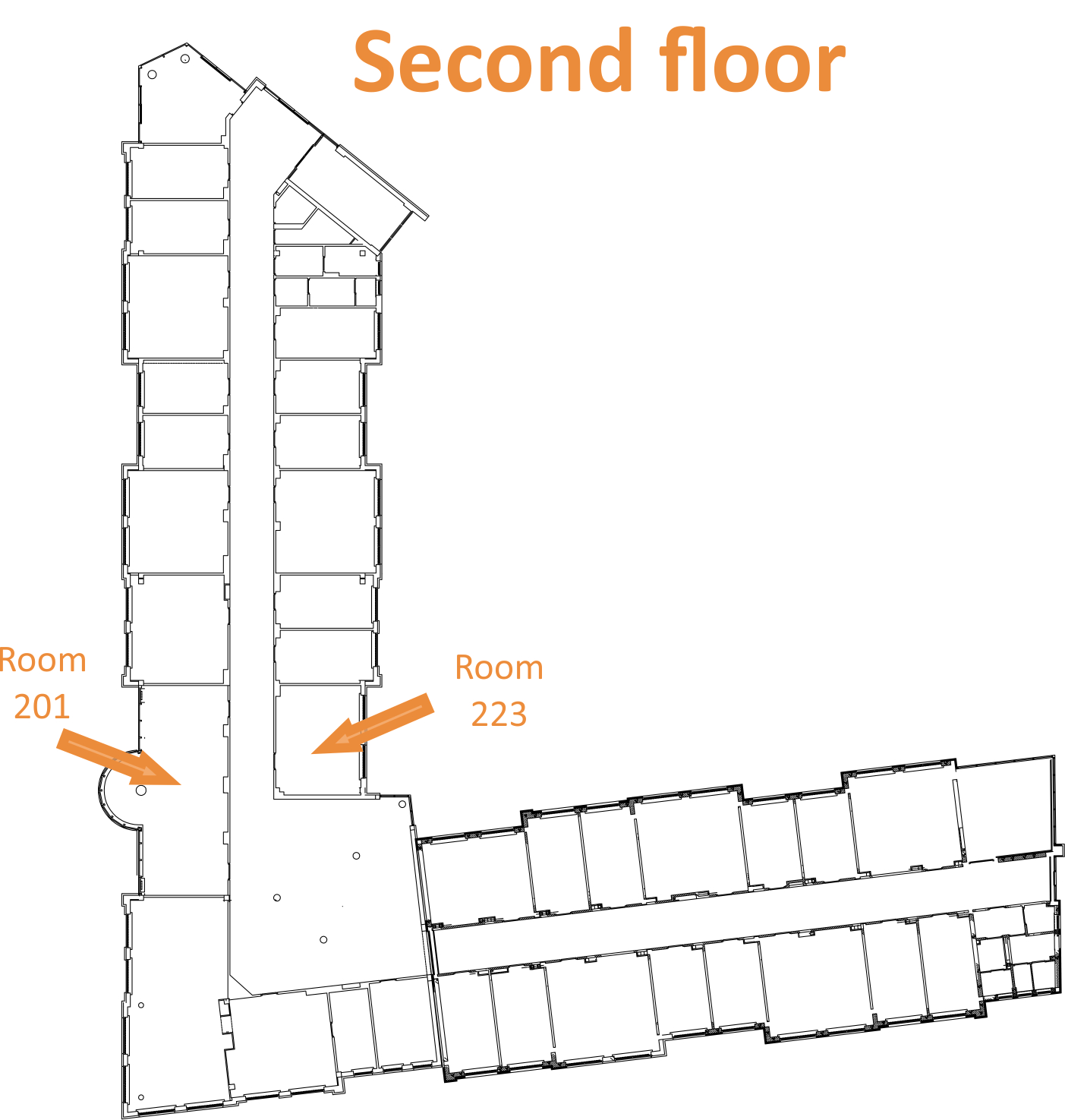
Poznań University of Technology Lecturing & Conference Center
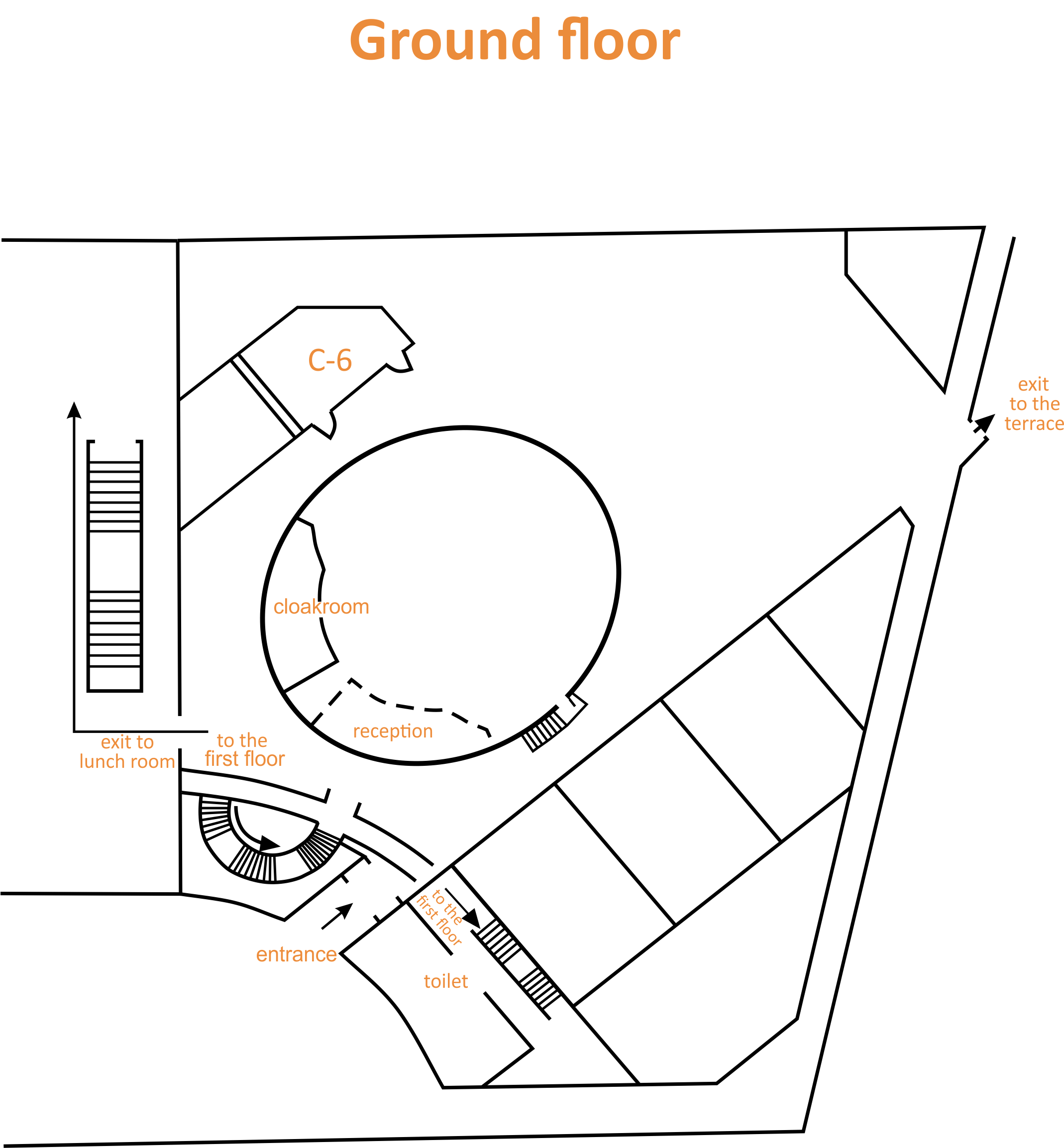
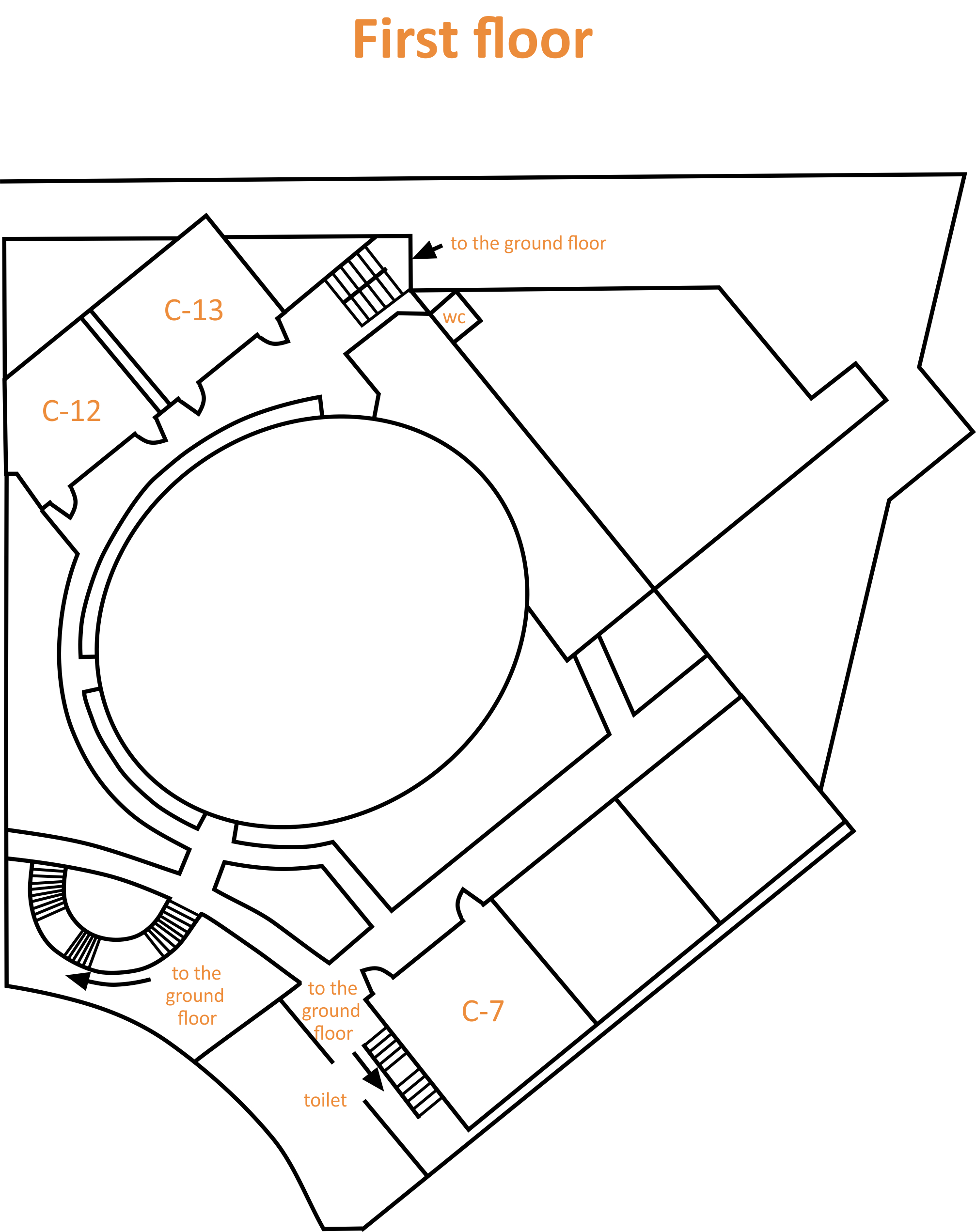
Sessions
Wednesday, September 21st, 2016
Session 1 (11:45-13:15): MIMO Systems
- A large system analysis of weighted sum rate maximization of single stream MIMO interference broadcast channels under linear precoding,
Wassim Tabikh and Dirk Slock (EURECOM, France); Yi Yuan-Wu (Orange Labs, France) - Comparison between a Hybrid Digital and Analog Beamforming System and a Fully Digital Massive MIMO System with Adaptive Beamsteering Receivers
Antoine Roze (Bcom, France); Matthieu Crussiere (IETR - Electronics and Telecommunications Research Institute of Rennes (IETR) & INSA - National Institute of Applied Sciences, France); Maryline Helard (INSA Rennes & IETR Institute of Electronics and Telecommunications of Rennes, France); Charlotte Langlais (Telecom Bretagne, France) - Achieving the optimal DoF with delayed and imperfect CSIT for the 3x2 X-Channel
Jaber Kakar (Ruhr-Universitaet Bochum, Germany); Zohaib Awan (RUB, Germany); Aydin Sezgin (RUB & Digital Communication Systems, Germany) - Time Reversal with Post-Equalization for OFDM without CP in Massive MIMO
Arman Farhang (CONNECT, Trinity College Dublin, Ireland); Amir Aminjavaheri and Ahmad RezazadehReyhani (University of Utah, USA); Linda Doyle (Trinity College Dublin, Ireland); Behrouz Farhang-Boroujeny (University of Utah, USA) - Exploiting MIMO Vertical Diversity in a 3D Vehicular Environment
Jayashree Thota (University of Bristol, United Kingdom); Reham Almesaeed (University of Bristol, United Kingdom); Angela Doufexi, Simon Armour and Andrew Nix (University of Bristol, United Kingdom)
Session 2 (11:45-13:15): New Waveforms (1)
- Blind Equalization using Constant Modulus Algorithm Adapted to OFDM/OQAM Modulation
Faouzi Bader (CentraleSupélec, France); Vincent Savaux (B-COM, France); Malek Naoues (Edison Ways, France) - Output SNR Analysis and Detection Criteria for Optimum DCT-Based Multicarrier System
Chang He and Lei Zhang (University of Surrey, United Kingdom); Juquan Mao (University of Surrey & London Southbank University, United Kingdom); Aijun Cao (ZTE Wistron Telecom AB, Sweden); Pei Xiao and Muhammad Ali Imran (University of Surrey, United Kingdom) - On Joint Modulation Design in Two-user Non-orthogonal Multiple Access Channe
Benjamin Ng and Chan-Tong Lam (Macao Polytechnic Institute, Macao) - Impact of RF transmitter hardware on 5G waveforms: Signal conditionings for UF-OFDM
Xin Yu (Nokia, Bell Laboratories, Germany); Thorsten Wild and Frank Schaich (Nokia Bell Labs, Germany)
Session 3 (11:45-13:15): Network and Channel Coding
- On the Reed-Muller Rule Under Channel Polarization
Christopher Schnelling and Anke Schmeink (RWTH Aachen University, Germany) - List-Output Priority-First Sequential Decoding for Physical-Layer Network Coding
Xiaokang Wang (Hongkong University of Science and Technology, Hong Kong); Wai Ho Mow (Hong Kong University of Science and Technology & HKUST, Hong Kong); Yunghsiang Sam Han (National Taiwan University of Science and Technology, Taiwan) - Space-Time Codes Based on Rank-Metric Codes and Their Decoding
Sven Puchinger, Sebastian Stern, Martin Bossert and Robert F.H. Fischer (Ulm University, Germany) - Polynomial-complexity GLRT-optimal noncoherent PNC
Maria Gkizeli and George N. Karystinos (Technical University of Crete, Greece) - MMSE Analysis and Soft Demapping for Coded MIMO-OFDM Systems
Mahmoud Abdullahi and Pei Xiao (University of Surrey, United Kingdom)
Session 4 (11:45-13:15): Multiple Access and Resource Allocation
- Two-Step Resource Allocation for BIC-UFMC Wireless Communications
Carmine Vitiello and Paolo Del Fiorentino (University of Pisa, Italy); Erica Debels (Ghent University, Belgium); Vincenzo Lottici, Filippo Giannetti and Marco Luise (University of Pisa, Italy); Marc Moeneclaey (Ghent University, Belgium) - Optimized Zone Design for Location-based Resource Allocation in Mobile D2D Underlay Networks
Mladen Botsov (BMW Group Research and Technology & Technische Universitat Berlin, Germany); Slawomir Stanczak (Fraunhofer Heinrich Hertz Institute & Technische Universitat Berlin, Germany); Peter Fertl (BMW Group Research and Technology, Germany) - Ultra-Reliable Communications in Failure-Prone Realistic Networks
Guillermo Pocovi and Mads Lauridsen (Aalborg University, Denmark); Beatriz Soret (Nokia Networks, Denmark); Klaus Pedersen (Nokia - Bell Labs, Denmark); Preben Mogensen (Nokia Siemens Networks, Aalborg, Denmark) - Non-Orthogonal FQAM for Multiple Access in the Uplink of 5G Wireless Networks
Mohammed Al-Imari (Samsung Electronics R&D Institute UK, United Kingdom); Belkacem Mouhouche (Samsung Electronics Research and Development UK, United Kingdom); Maziar Nekovee (Samsung Electronics, United Kingdom) - Interference Alignment in Heterogeneous Networks with Macro-to-Picocell Offloaded Users
Micael Bernhardt (Universidad Nacional del Sur & Universidad Nacional de Misiones, Argentina); Fernando Gregorio and Juan E. Cousseau (Universidad Nacional del Sur, Argentina); Taneli Riihonen and Risto Wichman (Aalto University School of Electrical Engineering, Finland)
Session 5 (14:30-16:00): mmWave Communications
- Full Rank Spatial Channel Estimation at Millimeter Wave Systems
Hsiao-Lan Chiang (Technical University of Dresden, Germany); Wolfgang Rave (Dresden University of Technology, Germany); Tobias Kadur (Techinische Universitat Dresden, Germany); Gerhard Fettweis (Technische Universitat Dresden, Germany) - Channel Estimation in Millimeter Wave MIMO Systems: Sparsity Enhancement via Reweighting
Samip Malla and Giuseppe Abreu (Jacobs University Bremen, Germany) - Transmit Power Minimization in Multi-User Millimeter Wave Systems
Samip Malla and Giuseppe Abreu (Jacobs University Bremen, Germany) - Towards 100 Gbps wireless communication: energy efficiency of ARQ, FEC, and RF-frontends
Lukasz Lopacinski (BTU Cottbus, Germany); Steffen Büchner (Brandenburgische Technische Universität Cottbus-Senftenberg, Germany); Jörg Nolte (BTU Cottbus, Germany); Marcin Brzozowski (IHP, Germany); Rolf Kraemer (IHP Microelectronics, Frankfurt/Oder & BTU-Cottbus, Germany)
Special Session 1 (14:30-16:00): PAPR Reduction and Power Amplifier Linearization for Energy Efficient 5G Network
- Investigation of AM-AM Performance in CMOS Digital Power Amplifiers
Rui Gomes (FEUP, Portugal); Candido Duarte (INESC TEC & FEUP, Portugal); Jose Pedro (ITA, Portugal) - PA Linearization of FBMC-OQAM Signals with Overlapped Recursive Error Correcting Predistortion
S S Krishna Chaitanya Bulusu (Conservatoire National des Arts et Metiers, France); Hmaied Shaiek (CNAM, France); Daniel Roviras (Cnam, France) - Spectral Performances of PAPR Reduced FBMC/OQAM Signals
Agathe Valette (ETIS, ENSEA, Universite Cergy-Pontoise, CNRS & Thales Communications & Security, France); Myriam Ariaudo (ETIS, ENSEA, Universite Cergy-Pontoise, CNRS, France); Lounis Zerioul (ETIS/ENSEA/Universite Cergy Pontoise, CNRS, France); Inbar Fijalkow (ETIS / ENSEA - University Cergy-Pontoise - CNRS, France); Sylvain Traverso (Thales Communications, France); Antonio M. Cipriano (Thales Communications and Security, France) - PAPR reduction and digital predistortion for non-contiguous waveforms with well-localized spectrum
Mahmoud Abdelaziz, Lauri Anttila, Markku K. Renfors and Mikko Valkama (Tampere University of Technology, Finland) - Influence of Filter-bank RF Transceiver Chain Imperfections on Digital Predistortion Performance
Tomas Gotthans, Roman Marsalek and Jakub Gotthans (Brno University of Technology, Czech Republic); Genevieve B. Baudoin (ESIEE, France)
Special Session 2 (14:30-16:00): Non-Orthogonal Access for 5G
- Coexistence of Filter Banks and CP-OFDM: What are the Real Gains?
Quentin Bodinier (CentraleSupelec/IETR, France); Faouzi Bader (CentraleSupelec, France); Jacques Palicot (CentraleSupelec/IETR, France) - Modulo-lattice Coding for Non-Orthogonal Access
Meryem Benammar (HUAWEI Technologies France, France); Abdellatif Zaidi (Universite Paris-Est Marne La Vallee, France); Jean-Claude Belfiore (Telecom Paristech & Huawei Technologies, France) - On the Number of Users Served in MIMO-NOMA Cellular Networks
Wonjae Shin (Seoul National University, Korea); Mojtaba Vaezi (Princeton University, USA); Jungwoo Lee (Seoul National University, Korea); H. Vincent Poor (Princeton University, USA) - A Game Theory Approach for User Grouping in Hybrid Non-Orthogonal Multiple Access Systems
Kaidi Wang, Zhiguo Ding and Wei Liang (Lancaster University, United Kingdom) - On Adaptive Access and Relay Link Resource Allocation for In-band Deployments
Alexander Sayenko (Samsung Electronics, Finland); Mikhail Zolotukhin and Timo Hämäläinen (University of Jyväskylä, Finland)
Session 6 (14:30-16:00): Wireless Power Transfer and Energy Harvesting
- Hybrid Backscatter Communication for Wireless Powered Communication Networks
Sung Hoon Kim (SungKyunKwan University, Korea); Dong In Kim (Sungkyunkwan University (SKKU), Korea) - Simultaneous Information and Power Transfer with Transmitters with Hardware Impairments
Ayca Ozcelikkale, Tomas McKelvey and Mats Viberg (Chalmers University of Technology, Sweden) - Optimization and Analysis of WLAN RF Energy Harvesting System Architecture
Syeda Munir and Osama Amjad (Ozyegin University, Istanbul, Turkey); Engin Zeydan (Turk Telekom Labs, Turkey); Ali Ozer Ercan (Ozyegin University, Turkey) - Energy-Efficient Algorithm Based on Multi-Dimensional Energy Space for Software-Defined Wireless Sensor Networks
Liao Wenxing and Wu Muqing (Beijing University of Posts and Telecommunications, P.R. China); Wu Yuewei (Beijing University of Post and Telecommunication, P.R. China)
Thursday, September 22nd, 2016
Session 7 (9:00-10:30): Full Duplex Communications
- Distortion-Loop-Aware Amplify-and-Forward Full-Duplex Relaying with Multiple Antennas
Omid Taghizadeh (RWTH Aachen University, Germany); Tianyu Yang (Institute for Theoretical Information Technology, RWTH Aachen, Germany); Ali Cagatay Cirik (University of British Columbia, Canada); Rudolf Mathar (RWTH Aachen University, Germany) - Can Full Duplex reduce the discovery time in D2D Communication?
Marta Gatnau Sarret (Aalborg University & Nokia, Denmark); Gilberto Berardinelli and Nurul H. Mahmood (Aalborg University, Denmark); Beatriz Soret (Nokia Networks, Denmark); Preben Mogensen (Aalborg University, Denmark) - Theoretical Analysis of Full-Duplex System with Power Control
Mohammed Al-Imari (Samsung Electronics R&D Institute UK, United Kingdom) - Robust Weighted Sum Rate Maximization over Full Duplex Multi-User MIMO Systems Under Imperfect CSIT
Yohannes Jote Tolossa and Giuseppe Abreu (Jacobs University Bremen, Germany)
Session 8 (9:00-10:30): New Modulation Schemes
- Coded Generalized Spatial Modulation for Structured Large Scale MIMO Systems
Daniel Franz (Universitat Rostock, Germany); Volker Kuehn (University of Rostock, Germany) - Faster than Sphere (Decoder). A Demodulation Algorithm for Multidimensional Constellations
Tomasz Markiewicz (Poznań University of Technology, Poland) - Sphere-Decoding Aided SIC for MIMO-GFDM: Coded Performance Analysis
Maximilian Matthe (Technical University Dresden, Germany); Dan Zhang and Gerhard Fettweis (Technische Universitat Dresden, Germany) - Interference analysis of FFT-FBMC scheme in time asynchronous contexts
Rostom Zakaria and Didier Le Ruyet (CNAM, France) - Double Spatial Modulation: A High-Rate Index Modulation Scheme for MIMO Systems
Zehra Yigit and Ertugrul Basar (Istanbul Technical University, Turkey)
Special Session 3 (9:00-10:30): Techniques and Technologies for Smart Environments
- Finding the Distribution of Users in a Cell from Smart Phone Based Measurements
Per H. Lehne (Telenor Research, Norway); Andrés Alayon Glazunov (Chalmers University of Technology, Sweden); Kristian Karlsson (SP Technical Research Institute of Sweden, Sweden) - A Measurement Based Evaluation of Feedback-Less MTC Using FBMC-OQAM
Maxim Penner, Martin Fuhrwerk and Jürgen Peissig (Leibniz Universitat Hannover, Germany) - Network Coding for Reliable Downlink Transmissions in Industrial Wireless Sensor and Actuator Networks
Jing Yue (The University of Sydney, Australia); Svetlana Girs, Johan Akerberg and Mats Bjorkman (Malardalen University, Sweden); Zihuai Lin (University of Sydney, Australia) - Delay Tolerant Networking for Smart City Through Drones
Colian Giannini (University of Bologna, Italy); Ali Shaaban (Unibo, Italy); Chiara Buratti and Roberto Verdone (University of Bologna, Italy) - A Stackelberg Game Based Task Offloading Mechanism for ad-hoc Based Mobile Cloud Computing
Li Tianze, Wu Muqing and Min Zhao (Beijing University of Posts and Telecommunications, P.R. China)
Session 9 (9:00-10:30): Traffic Management in Future Networks
- Accurate Traffic Shaping Algorithms for IEEE 802.16-2012 Based WiMAX Networks
Volker Richter (Technische Universitat Dresden, Germany) - On Network Coded Distributed Storage: How to Repair in a Fog of Unreliable Peers
Juan A Cabrera (Technische Universitat Dresden, Germany); Daniel E. Lucani (Aalborg University, Denmark); Frank H.P. Fitzek (Technische Universitat Dresden & ComNets - Communication Networks Group, Germany) - Flexible Capacity and Traffic Management for Hybrid Satellite-Terrestrial Mobile Backhauling Networks
Jesus Mendoza (Polytechnic University of Catalonia, Spain); Ramon Ferrús and Oriol Sallent (Universitat Politecnica de Catalunya, Spain) - A Modulated Throughput Driven Rate Adaptation Algorithm for Dynamic HTTP Streaming
Venkata Phani Kumar M and Sudipta Mahapatra (Indian Institute Technology, Kharagpur, India)
Session 10 (15:45-17:15): Wireless Communications in Transportation
- STFDMA: A Novel Technique for Ad-Hoc V2V Networks Exploiting Radio Channels Frequency Diversity
Miguel Angel Gutierrez-Estevez (Fraunhofer Heinrich Hertz Institute, Germany); David Gozalvez-Serrano (BMW Group Research and Technology, Germany); Mladen Botsov (BMW Group Research and Technology & Technische Universität Berlin, Germany); Slawomir Stanczak (Fraunhofer Heinrich Hertz Institute & Technische Universität Berlin, Germany) - Reliable Message Forwarding in VANETs for Delay-Sensitive Applications
Karsten Roscher (Fraunhofer ESK, Germany); Gerhard Maierbacher (Fraunhofer Institute for Embedded Systems and Communication Technologies ESK, Germany) - Cellular Network Quality Improvements for High Speed Train Passengers by on-board Amplify-and-Forward Relays
Taulant Berisha, Philipp Svoboda and Christoph F Mecklenbräuker (Vienna University of Technology, Austria); Stephan Ojak (OEBB Technische Services GmbH, Austria) - First Analysis of Inside Train Communication with ITS-G5 Measurement Data
Mohammad Soliman (Deutsches Zentrum fur Luft- und Raumfahrt, Germany); Paul Unterhuber (German Aerospace Center (DLR), Germany); Damini Gera (Technische Universitat Ilmenau, Germany)
Session 11 (15:45-17:15): New Waveforms (2)
- Phase Offset Estimation of SOQPSK waveform by the Analysis of the Angle Distribution
Rami Othman (CentraleSupelec/IETR & Zodiac Data Systems, France); Alexandre Skrzypczak (Zodiac Data Systems, France); Yves Louet (CentraleSupelec, France) - Performance of Soft-Decision Linear Receivers for Spatial-Multiplexing FBMC/OQAM
David Demmer and Jean-Baptiste Doré (CEA, France); Didier Le Ruyet (CNAM, France); Robin Gerzaguet (CEA-Leti, France) - Low-complexity Lattice Reduction Aided Detection for Generalised Spatial Modulation
Yumeng Bao and Li Zhang (University of Leeds, United Kingdom); Renhong Xie (Nanjing University of Science and Technology, P.R. China); Raymundo Ramirez-Gutierrez (University of Leeds, United Kingdom) - System Level 5G Evaluation of GFDM Waveforms in an LTE-A Platform
Ghaith Al-Juboori, Angela Doufexi and Andrew Nix (University of Bristol, United Kingdom)
Special Session 4 (15:45-17:15): Low Power Design Techniques for Embedded Systems
- Efficient Modelling of FPGA-based IP blocks using Neural Networks
Jordane Lorandel (INSA Rennes, France); Jean-Christophe Prevotet (INSA, France); Maryline Helard (INSA Rennes & IETR Institute of Electronics and Telecommunications of Rennes, France) - Implementation and Analysis of a Turbo-FSK transceiver for a new Low Power Wide Area Physical Layer
Jeremy Estavoyer and Yoann Roth (CEA-Leti, France); Jean-Baptiste Dore (CEA, France); Vincent Berg (CEA LETI, France) - Accurate Measurement of Power Consumption Overhead During FPGA Dynamic Partial Reconfiguration
Amor Nafkha and Yves Louet (CentraleSupelec, France) - Dynamic and Partial Reconfiguration Power Consumption Runtime Measurements Analysis for ZYNQ SoC Devices
Mohamad AlFadl Rihani (IETR INSA Rennes, France); Fabienne Nouvel (INSA IETR RENNES, France); Jean-Christophe Prévotet (INSA, France); Mohamad Mroue and Yasser Mohanna (Lebanese University, Lebanon); Jordane Lorandel (INSA Rennes, France)
Special Session 5 (15:45-17:15): Trade-offs of Green Networking – From the Access to the Core
- Trade-offs in green core networking (invited talk)
Filip Idzikowski (Poznan University of Technology, Poland) - Joint Remote Radio Head Activation and Beamforming for Energy Efficient C-RAN
Yan Zeng (Beijing University of Posts and Telecommunications, P.R. China); Xiangming Wen and Zhaoming Lu (BUPT, P.R. China); Yawen Chen (Beijing University of Posts and Telecommunications, P.R. China); Hua Shao (BUPT, P.R. China) - Balancing Infrastructure Fatigue, Energy Consumption and User Profits in Cellular Networks
Andrea Baiocchi (University of Roma Sapienza, Italy); Luca Chiaraviglio (CNIT, Italy); Francesca Cuomo and Valentina Salvatore (University of Rome Sapienza, Italy) - Modeling Energy Availability in RF Energy Harvesting Networks
Daniela Oliveira and Rodolfo Oliveira (Nova University of Lisbon, Portugal)
Friday, September 23rd, 2016
Session 12 (9:00-10:30): WiFi Technology
- Dynamic network configuration: Hotspot identification for Virtual Small Cells
Thomas Varela Santana and Ana Galindo-Serrano (Orange Labs); Berna Sayrac and Sofia Martinez Lopez (Orange Labs, France) - Power Consumption of Wi-Fi Transceivers
Marie Le Bot and Wissem Benali (Orange Labs, France); Charlotte Langlais (Telecom Bretagne, France); Sylvie Kerouedan (Telecom Bretagne / Institut Mines-Telecom, France) - Modeling Leader-based Multicast Transmission via Periodic Reservations in Wi-Fi networks
Aleksandr Sergeevich Ivanov, Evgeny Khorov, Egor Kuznetsov and Andrey Lyakhov (IITP RAS, Russia) - Promise and Perils of Dynamic Sensitivity Control in IEEE 802.11ax WLANs
Zhenzhe Zhong (Orange Labs, France); Fengming Cao (Toshiba Research Europe, United Kingdom); Parag Kulkarni (Toshiba Research Europe Ltd., United Kingdom); Zhong Fan (Toshiba Research Europe, United Kingdom)
Session 13 (9:00-10:30): Wireless Network Design and Optimization
- Evolutionary algorithms for multiobjective optimization of frequency reuse schemes in CoMP-based MIMO-OFDMA networks
Javier Pastor-Perez, Felip Riera-Palou and Guillem Femenias (University of the Balearic Islands, Spain) - On the benefits of early HARQ feedback with non-ideal prediction in 5G networks
Gilberto Berardinelli (Aalborg University, Denmark); Saeed Reza Khosravirad (Nokia - Bell Labs, Poland); Klaus Pedersen (Nokia - Bell Labs, Denmark); Frank Frederiksen (Nokia & Networks, Denmark); Preben Mogensen (Aalborg University, Denmark) - Knowledge-based 5G Radio Access Network Planning and Optimization
Jordi Perez-Romero (Universitat Politecnica de Catalunya (UPC), Spain); Oriol Sallent, Ramon Ferrus and Ramon Agustí (Universitat Politecnica de Catalunya, Spain) - An Architecture for Spectrum Management and Coordinated Control in 5G Heterogeneous Network
Bartosz Bossy and Adrian Kliks (Poznan University of Technology, Poland); Shah Nawaz Khan and Roberto Riggio (Create-Net, Italy); Leonardo Goratti (Create-net, Italy)
Session 14 (9:00-10:30): Ad-hoc and Sensor Networks
- Maximizing Strong Barriers in Lifetime-Heterogeneous Directional Sensor Network
Ruisong Han (Beijing Jiaotong University, P.R. China); Li Zhang (University of Leeds, United Kingdom); Wei Yang (Beijing Jiaotong University, P.R. China) - Smart Decision Making Policy for Faster Harvesting From Ambient RF Sources in Wireless Sensor Nodes
Sumit Jagdish Darak (IIIT-Delhi, India); Christophe Moy (CentraleSupelec/IETR, France); Jacques Palicot (CentraleSupelec/IETR, France) - Topology Design of Fully Connected Hierarchical Mobile Ad-Hoc Networks
Lina Mroueh (Institut Superieur d'Electronique de Paris, France); Achraf Kessab (Telecom Paristech & Thales Communications & Security, France); Philippe Martins (Telecom Paristech, France); Serge Hethuin (Thales Communication and Security, France); Isabelle Bucaille (Thales Communications, France) - Communication scheduling for fast distributed averaging in sensor networks
Maciej Patan (University of Zielona Gora, Poland); Adam Romanek (University of Zielona Góra, Poland)
Special Session 6 (9:00-10:30): New methods for Wireless LANs
- Performance of GFDM-Maximal Ratio Transmission over Nakagami-m Fading Channels
Piotr Remlein (Poznan University of Technology & Chair of Wireless Communications, Poland); Tansal Gucluoglu (Yildiz Technical University, Turkey); Ayhan Yenilmez (Yildiz Technical University, Istanbul, Turkey) - Handoff Management Scheme Based on Frame Loss Rate and RSSI Prediction for IEEE 802.11 Networks
Tao Lei (Beijing University of Posts and Telecommunications & Beijing Key Laboratory of Network System Architecture and Convergence, P.R. China); Xiangming Wen (Beijing University of Posts and Telecommunications, P.R. China); Zhaoming Lu, Wenpeng Jing and Biao Zhang (BUPT, P.R. China); Gang Cao (Beijing University of Posts and Telecommunications, P.R. China) - Secret Key Generation Using Channel Quantization with SVD for Reciprocal MIMO Channels
Haji Madni (Istanbul Medipol University & School of Engineering and Natural Science Electrical, Electronics and Cyber Systems, Turkey); Jehad Hamamreh and Huseyin Arslan (Istanbul Medipol University, Turkey) - A Modified Matern Hard Core Point Process for Modeling and Analysis of Dense IEEE 802.11 Networks
Tao Lei (Beijing University of Posts and Telecommunications & Beijing Key Laboratory of Network System Architecture and Convergence, P.R. China); Xiangming Wen (Beijing University of Posts and Telecommunications, P.R. China); Zhaoming Lu (BUPT, P.R. China); Wenpeng Jing, Kun Chen and Xiaoguang Zhao (Beijing University of Posts and Telecommunications, P.R. China) - Several EDCA Parameter Sets for Improving Channel Access in IEEE 802.11ax Networks
Evgeny Khorov, Vyacheslav Loginov and Andrey Lyakhov (IITP RAS, Russia)
Session 15 (13:45-15:15): Relay Issues
- Outage Performance of Dual Hop Full-Duplex MIMO Relay Networks with TAS/MRC over Rayleigh Fading Channels
Mesut Toka and Oguz Kucur (Gebze Technical University, Turkey) - Store-then-Cooperate: Energy Harvesting Scheme in Cooperative Relay Networks
Akashkumar Rajaram (University of Tartu, Estonia); Dushantha Nalin K. Jayakody (University of Tartu, Estonia; National Research Tomsk Polytechnic University, Russia); Vitaly Skachek (University of Tartu, Estonia) - Finite Blocklength Performance of Multi-Hop Relaying Networks
Fangchao Du (University of Science and Technology of China, P.R. China); Yulin Hu (RWTH Aachen University, Germany); Ling Qiu (University of Science and Technology of China, P.R. China); Anke Schmeink (RWTH Aachen University, Germany) - An Accurate BER Bound for Linear-Combining-Based Decoders in Decode-and-Forward Relay Channels
Zhen Luo (City University of Hong Kong, Hong Kong); Bin Qian (Hong Kong University of Science and Technology, Hong Kong); Wai Ho Mow (Hong Kong University of Science and Technology & HKUST, Hong Kong)
Session 16 (13:45-15:15): Channel Equalization, Prediction and Tracking
- MMSE Equalization for FBMC Transmission over Doubly-Selective Channels
Ljiljana Marijanovic (Technische Universitat Wien, Austria); Stefan Schwarz and Markus Rupp (TU Wien, Austria) - Measurement Model Optimization for Channel Prediction Improvement in Wireless Networks
Afef Feki (France Research Center, Huawei Technologies, France); Mustapha Amara (France Research Center, Huawei Technologies Co., Ltd., France); Sami Mekki (France Research Center, Huawei Technologies, France) - Data-Aided Autoregressive Sparse Channel Tracking for OFDM Systems
Ayse Betul Buyuksar (Istanbul Technical University, Turkey); Habib Senol and Serhat Erkucuk (Kadir Has University, Turkey); Hakan A. Çirpan (Istanbul Technical University, Turkey) - A Novel Channel Estimator for Zero-Tail DFT-spread-OFDM
Gilberto Berardinelli (Aalborg University, Denmark); Klaus Pedersen (Nokia - Bell Labs, Denmark); Frank Frederiksen (Nokia & Networks, Denmark); Preben Mogensen (Nokia Siemens Networks, Aalborg, Denmark); Kari Pajukoski (Nokia, Finland) - Adaptive LMS-Type Filter for Cyclostationary Signals
Nir Shlezinger (Ben Gurion University, Israel); Koby Todros (Ben Gurion University of the Negev, Israel); Ron Dabora (Ben-Gurion University, Israel)
Session 17 (13:45-15:15): Antennas, Radars and Propagation
- A Novel Geometrical Height Gain Model for Line-of-Sight Urban Micro Cells Below 6 GHz
Ignacio Rodriguez (Aalborg Universitet, Denmark); Huan Cong Nguyen (Aalborg University & Faculty of Engineering and Science, Denmark); Troels B. Sorensen (Aalborg University, Denmark); ZhuYan Zhao and Hao Guan (Nokia Siemens Networks, P.R. China); Preben Mogensen (Nokia Siemens Networks, Aalborg, Denmark) - An outdoor TV band Radio Environment Map for a Manhattan like layout
Anna Umbert (University Politecnica of Catalunya, Spain); Ferran Casadevall (Universitat Politecnica de Catalunya, Spain); Estuardo Gabriel Rodríguez (University Politecnica de Catalunya, Spain) - Cloaking of the Cylindrical Dielectric Structure with Double Slot Square Loop Cells
Mahdiye Rahzani (Shahed, Iran); Gholamreza Dadashzadeh and Mohammadreza Khorshidi (Shahed University, Iran) - On Link Combining Method for Highly Reliable Future Wireless Communication
Maciej Soszka (Vodafone Chair Mobile Communications Systems, Germany); Meryem Simsek and Gerhard Fettweis (Technische Universitat Dresden, Germany) - Widely-Linear Processing for Distributed Passive Radar Systems with Strictly Non-Circular Sources
Omid Taghizadeh (RWTH Aachen University, Germany); Vimal Radhakrishnan (Institute for Theoretical Information Technology, RWTH Aachen, Germany); Rudolf Mathar (RWTH Aachen University, Germany)
Session 18 (13:45-15:15): Traffic and Protocols
- Multi-tenant Mobility Control in Small Cells as a Service
Oriol Sallent (Universitat Politecnica de Catalunya, Spain); Jordi Perez-Romero (Universitat Politecnica de Catalunya (UPC), Spain); Ramon Ferrus and Ramon Agusti (Universitat Politecnica de Catalunya, Spain) - Transport Protocols Behaviour Study in Evolving Mobile Networks
Rui Li (University of Edinburgh & Samsung Electronics R&D Institute UK, United Kingdom); Mehrdad Shariat (Samsung R&D Institute UK, United Kingdom); Maziar Nekovee (Samsung Electronics, United Kingdom) - On the Impact of Multi-User Traffic Dynamics on Low Latency Communications
Guillermo Pocovi (Aalborg University, Denmark); Klaus Pedersen (Nokia - Bell Labs, Denmark); Beatriz Soret (Nokia Networks, Denmark); Mads Lauridsen (Aalborg University, Denmark); Preben Mogensen (Nokia Siemens Networks, Aalborg, Denmark) - CLF-MAC: A Coordinated MAC Protocol Supporting Lossy Forwarding in WLANs
Katarzyna Kosek-Szott, Marek Natkaniec, Lukasz Prasnal and Szymon Szott (AGH University of Science and Technology, Poland)
Workshops
Hands-on workshop on Rapid Prototyping of Next Generation Wireless Systems
National Instruments would like to invite all participants of ISWCS 2016 conference to take part in a free hands-on workshop on Rapid Prototyping of Next Generation Wireless Systems. During this half-day event participants will have a chance to learn and explore on their own how NI LabVIEW and NI USRP software defined radio enable quick prototyping of wireless communication systems for teaching and research applications.
Please follow this link to learn more and register for the event: poland.ni.com/wydarzenia/iswcs-sdr-workshop
